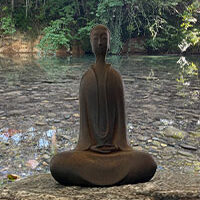The disciple must meditate on love and awareness
and not be distracted by the world.
The worldly life cannot bring peace.
Dhammapada Vs 371
Fear needs a friend.
The following incident took place on the third day during my very first visit to India. The full account is available in my autobiography: A journey to Awakening.
….The next day I took my train to Budh Gaya.
I arrived at the main station in New Delhi, in good time only to be overwhelmed by the sheer number of people on the platform. I saw one young Western man sitting quite high on some boxes and made my way towards him.
We nodded at each other and I spoke.
“Wow, the platform is really full,” l said in the most casual voice I could muster, the anxiety having presented itself again.
“Yes,” he said quite dreamily, “a sea of people.”
I hated him for that. For not supporting my fear. For thinking this is quite acceptable, so many people wandering around obviously knowing exactly what they were supposed to do. I wanted to leave this terrible person, but I stayed close, for my own sense of protection…….
Fear is a debilitating feeling, and closes us down to life and its potential, and we see danger and threats everywhere.
Of course, we can always explain and justify this sense of dread, but to do so brings no benefit as it prepares the habit for the next time. And that habit becomes our view of life.
Of course, this view is supported and promoted by the media and respective governments to keep people contained in small uncertain lives where risk and taking a chance is seen as foolish and where it is better to stay quiet and simply follow the status quo, and so we associate with those whose fear of fear is most like ours. Now we have a culture where standing alone to promote love, compassion and joy in all circumstances and for all beings, is often seen as a madness and even a threatening posture. We enjoy uniformity of ideas, and so we can comfortably feel that ‘everybody’s happy when everybody’s suffering,’ and that we are all, ‘in the same boat.’
Naturally, the Dhamma view is different.
We must of course take care with our lives and how we live, but from a loving position, and not from a fearful one.
It is love that opens our heart and our life, and it is fear that closes it down.
Once we find the truth and reality of the emptiness of life manifesting in the adage that whatever is important for us is only important because we make it important, we can let go of fear.
Fear is never a friend and is only a condition of mind manifesting in different moments, a subtle sensation in the body that then requires a story to enable it. But its nature is to be empty and only ever has the power that we give it.
Being afraid of something doesn’t necessarily prevent it, but being lovingly accepting of the possibility of it, immediately changes our relationship to it.
The language we use to define something also adds to a fear base.
We can express every thought, mood, feeling and emotion and paint a picture for the world. This is why the words we chose are very important both to ourselves and others.
In short, the language we use determines our relationship to the situation we are experiencing.
Politicians, public speakers and the media know this very well and so they use a form of language that is designed to instill fear and a specific reaction, and it is through fear that we can be controlled.
But that deliberate attempt to paint a dramatic and fear-based picture is in the end shallow, and so needs to be cultivated and maintained.
The world that we experience is the one that we create for ourselves by empowering our mind states in different moments.
When we empower love, our life becomes loving, and love itself is known as the fearless state. When we empower fear, our life becomes fearful, and so the potential for joy and happiness is greatly reduced.
The Dhamma disciple often find themselves in a world where they no longer belong, simply because they have transcended the myth of the usefulness of fear.
We stand strong and alone offering love and acceptance to all beings.
With awareness we see.
With Love we accept.
With wisdom we respond.
This is Dhamma.
May all beings be happy.
*******
Koan:
Someone asked, “Master, have you been to hell?”
He replied, “I was the first one there,”
“How could a great Master like you have arrived from hell?” cntinued the questioner.
“How could I show you Dhamma if I had not been there?” the Master answered.
Quotation:
Vipassana meditation works by allowing us to see the mind in its natural state without any desire to change it to something different.
From Not This, by Michael Kewley.
*******
Follow Michael on facebook
Next Pure Dhamma Newsletter, January 2025
To unsubscribe from the newsletter,
please send an e-mail to dhammateacher

